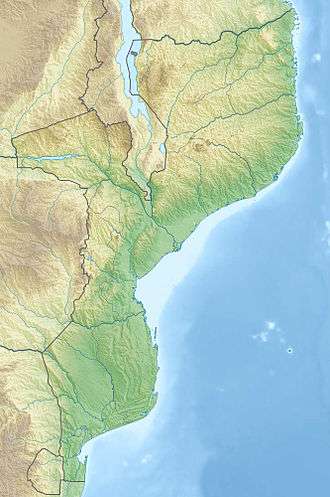Mount Mabu
| Mount Mabu | |
|---|---|
 Mount Mabu Location of Mount Mabu in Mozambique | |
| Highest point | |
| Elevation | 1,700 m (5,600 ft) |
| Coordinates | 16°17′52″S 36°23′39″E / 16.29778°S 36.39417°ECoordinates: 16°17′52″S 36°23′39″E / 16.29778°S 36.39417°E |
| Geography | |
| Location | Mozambique |
Mount Mabu is a mountain in northern Mozambique, famous for its old-growth rainforest. Mount Mabu is approximately 1,700 metres (5,600 feet) high and the forest covers about 7,000 hectares (27 square miles). While well-known locally, the Mount Mabu forest and its extremely diverse wildlife were unknown to plant and animal scientists until 2005. It was "discovered" by scientists from Kew Royal Botanic Gardens by browsing Google Earth's satellite view to look for potential unknown wildlife hotspots in Africa.[1][2] It is frequently referred to as the "Google Forest".[3][1][4]
Several new species have been discovered in the Mount Mabu forest. The isolation of the rainforest, surrounded by savannah, makes it likely that it is host to many previously undiscovered species. Named species so far include:
- Helixanthera schizocalyx, a tropical mistletoe in the Loranthaceae family. It is a hairless parasitic shrub that attaches to tree branches, growing up to 50 cm (1.6 ft) high.[3]
- Nadzikambia baylissi, a pygmy chameleon. It is only the second species in what was previously a monotypic genus, Nadzikambia.[5]
- Atheris mabuensis, a bush viper.[6]
- Cymothoe baylissi, a butterfly.[7]
Other newly discovered species include four butterflies, two more species of snakes, a species of crab, and five plants. There are likely many more new species in the forest, with likely candidates so far including a shrew, a pseudo-scorpion, frogs, snails, bats, catfish, and various insects.[8]
Among 126 species of birds identified, there are seven new populations of globally threatened species of birds in the forest, including the Thyolo alethe, whose other populations are all threatened by logging and deforestation. Others include Swynnerton's robin and Namuli apalis.[9][1]
In June 2009, the Mozambique government announced that they would establish conservation measures to prevent commercial logging. The Mabu forest is believed to be the largest medium-altitude rainforest in Africa.[10] African forests that are unspoiled by logging and other human activity are rare. The Mount Mabu forest is surrounded by areas devastated by the Mozambican Civil War (1977-1992). Poor road access, ignorance of the forest, and its use as a refuge for local villagers during the war all contributed to its protection. No records of previous expeditions or collecting trips have been discovered.[2]
See also
References
- 1 2 3 "Exploring the 'Google forest'". BirdLife International. 26 January 2009. Retrieved 15 February 2011.
- 1 2 Jowit, Juliette (21 December 2008). "British team discovers lost Eden amid forgotten forest of Africa". The Guardian. Retrieved 15 February 2011.
- 1 2 "Helixanthera schizocalyx". Kew Plants & Fungi. Royal Botanical Gardens, Kew. Archived from the original on 23 December 2010. Retrieved 15 February 2011.
- ↑ Fisher, Jonah (11 June 2009). "Exploring the 'Google forest'". BBC News. Retrieved 15 February 2011.
- ↑ Branch, William R.; Tolley, Krystal A. (October 2010). "A new species of chameleon (Sauria: Chamaeleonidae: Nadzikambia) from Mount Mabu, central Mozambique". African Journal of Herpetology. 59 (2): 157–172. doi:10.1080/21564574.2010.516275.
- ↑ Branch WR, & Bayliss J (2009). "A new species of Atheris (Serpentes: Viperidae) from northern Mozambique". Zootaxa. 2113: 41–54.
- ↑ Barbee, Jeffrey (25 March 2017). "'Who knows what we'll find next?' Journey to the heart of Mozambique's hidden forest". The Guardian. Retrieved 26 March 2017.
- ↑ Barbee, Jeffrey (6 July 2009). "Expedition Discovers New Chameleon". Global Post. Retrieved 15 February 2011.
- ↑ "Many New Species Discovered In Hidden Mozambique Oasis With Help Of Google Earth". Science Daily. 1 February 2009. Retrieved 15 February 2011.
- ↑ Windsor, Antonia (27 June 2009). "Mozambique agrees to protect lost rainforest of Mount Mabu". The Guardian. Retrieved 15 February 2011.
External links
- Undiscovered rainforest 'Googled'
- Mozambique agrees to protect lost rainforest of Mount Mabu
- Hidden forest of Mozambique
- Exploring the 'Google forest'
- "Google Earth helps Kew..." - Kew Science News
- Pictures of Mount Mabu, including some of the new species found
- NASA caption
- Exploring the 'Google forest'
- Discovering a 'lost forest'
- Exploring the 'Google forest'
- The Mountains of Mozambique
- Scientists find new wonders in Mozambique
- 'Pictures of Mount Mabu and new species'
- Closer look: Mount Mabu and ‘the Google forest’